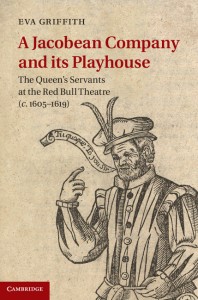The following is taken from the beginning of a paper given at a Women and Indian Shakespeares Conference. The panel on which it was given was called ‘Rewriting Shakespeare’s Women in Practice’, and included in the line-up was Rani Drew, a playwright alluded to in the paper.

The London Clown, Saturday 13 April 2019 at the London Metropolitan Archives
Eva Griffith and others explored the donation of funny people to our landscape. Including funny-women in silent film and Anthrax the Clown!

29/8/2018 – #RedBullPlaque Day!
Over 100 people attended the unveiling of the plaque marking the site of the Red Bull Playhouse in Haywards Place, Islington.
2018: A Christopher Beeston Year

Guy Henry as Christopher Beeston in Dr. Griffith’s Red Bull Book Film
Dr. Griffith has designated 2018 a Christopher Beeston Year, as she ponders this actor, once a fellow with Shakespeare’s Chamberlain’s Men at the Curtain in Shoreditch. Instead of following this company to the Bankside Globe, Beeston joined Edward Somerset, fourth earl of Worcester’s company, later to be given patronage by Queen Anna of Denmark, James I’s wife.
Beeston became an actor-manager of the Queen’s Servants’ company while at the Red Bull in St. John Street, Clerkenwell. This was in 1612 after the death of Thomas Greene, the company clown.
It was as a Queen Anna’s man that Christopher became the first to engender a playhouse in Drury Lane – an indoor playhouse, different to the Bull – the Cockpit Phoenix playhouse. This theatre was the first entertainment venue, therefore, in what we now term ‘The West End’.
A Jacobean Company and Its Playhouse
 Dr. Griffith’s book tells the previously untold story of the Servants of Queen Anna of Denmark, a group of players parallel to Shakespeare’s King’s Men, and their London playhouse, The Red Bull. Griffith sets the playhouse in the historical context of the Seckford and Bedingfeld families and their connections to the site.
Dr. Griffith’s book tells the previously untold story of the Servants of Queen Anna of Denmark, a group of players parallel to Shakespeare’s King’s Men, and their London playhouse, The Red Bull. Griffith sets the playhouse in the historical context of the Seckford and Bedingfeld families and their connections to the site.
Reviews
Andy Kesson, Medieval and Renaissance Drama in England, Vol.29 (2016) "This repertory study of the Queen's Servants is immensely detailed, carefully researched and full of generous doses of archival discoveries… [It] usefully revisits and rethinks a company that is, when not overlooked, … Read More...
Tom Rutter, Early Modern Literary Studies, Vol.19 no.2 (2017) "Eva Griffith's book, which complements her previously published research on the [Red Bull] playhouse… should be a vital starting point for anyone working on the Red Bull and on the Queen's Men, who performed there until 1619.…Griffith … Read More...
Leeds Barroll, Shakespeare Quarterly, 2016 (Vol. 67, No.2, 282) "Certainly Griffith's book deserves to be ranked with other important studies of the drama of the Stuart era." … Read More...
Siobhan Keenan, Theatre Notebook, 2015 (Vol. 69, No. 1, 65-66) ...Based on a wealth of original archival research, Griffith’s book invites scholars to re-examine traditional assumptions about Queen Anna’s men. This includes drawing attention to the fact that the company did not confine itself to … Read More...
